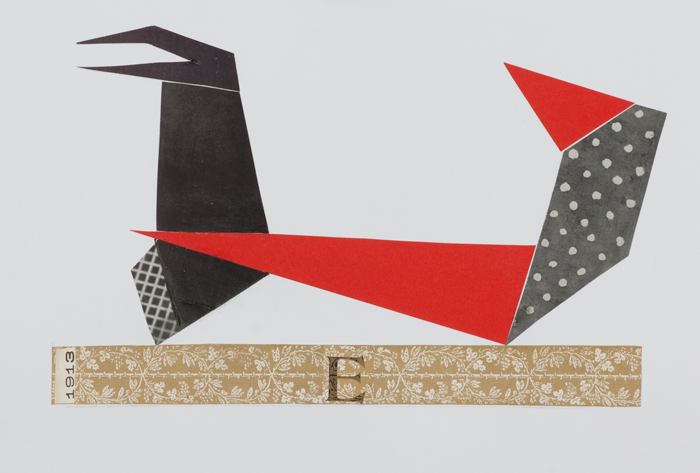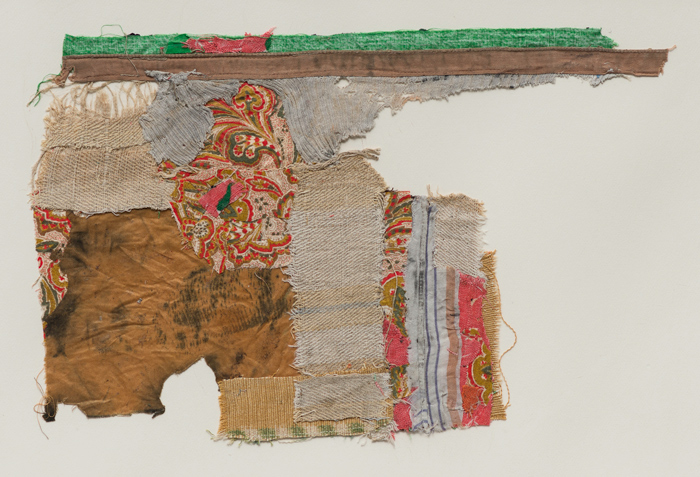
Geta Brătescu: “The Studio: A Tireless, Ongoing Space”
7 April-18 June 2017
Ninety-one year old Romanian artist Geta Brătescu’s vivid practice has comprised performance, textile work, paper collage, print-making, film and installation. “The Studio: A Tireless, Ongoing Space” at London’s Camden Arts Centre provides a rare opportunity to discover the breadth of the artist’s oeuvre through her long-standing yet not widely known practice.
Living and working for most of her life in Bucharest under Ceaușescu’s repressive communist regime, Brătescu embraced the studio as an autonomous space, free from economic or political influences. Her exhibition at Camden Arts Centre focuses on this lifelong approach to the studio as a performative, contemplative and critical space to reflect on one’s own position in the world.
Throughout her career she has looked at this space as a place to redefine the self, raising questions of identity, dematerialisation, ethics and femininity. Fascinated by literature, stories from Aesop and Kafka and prominent figures such as Medea, Dido or Faust reappear in her work, forming a repertoire of philosophical enquiry.
Much of Brătescu’s practice dissipates boundaries between art and life. Incorporating everyday items such as cigarette papers, teabags and the wooden stirrers from her daily coffee, works accrue time throughout their production, taking on a diaristic nature. This reflection on the everyday takes on a particular autobiographical intimacy in seminal pieces such as Vestiges (Vestigii), 1978, where fabric scraps inherited from her mother over the years are carefully configured on the page. Other works employ methods associated with revealing hidden emotions and internal conflicts, such as automatic drawing, ink-blot pictures and regularly drawing with her eyes closed, where Brătescu taps into an inner consciousness to bring gesture and association to the fore.

As well as being the subject of much of her work, Brătescu’s studio was also the stage for temporary installations and performances to camera. Film works capture her experiments in material rearrangements, measuring space against her body and charting the movement of her hands, whilst in photographic series she poses to camera, recording the disappearance or concealment of her own image.
Industrial geometric forms reappear in many works, informed and influenced by her residencies as part of the Artist Union and her long-term role as Art Director for Romania’s main cultural magazine Secolul 20. Works from her collaged series, described by the artist as “drawing with scissors”, playfully choreograph movement, form and shape. Encouraging elements of chance, Brătescu carves out the studio as a space for continual experimentation and freedom of imagination.
At 91 years old, Brătescu continues to be a prolific artist working in her studio every day. Many of the works in the exhibition were borrowed directly from her studio, having seldom been exhibited.
Geta Brătescu is representing Romania at the 2017 Venice Biennale with a project curated by Magda Radu, Curator and Art Historian at Salonul de proiecte Bucharest. In collaboration with the Romanian pavilion, Camden Arts Centre Director Jenni Lomax will give a talk about Brătescu’s work in Venice in September.
“The Studio: A Tireless, Ongoing Space” is organised by Camden Arts Centre in association with Museum of Fine Arts, Ghent. Supported by the Romanian Cultural Institute in London and the Geta Brătescu Exhibition Circle.
(adapted from the gallery’s press materials)
INFORMATION
Camden Arts Centre
Arkwright Road
London NW3 6DG United Kingdom
+44 (0) 20 7472 5500
Hours:
Tuesday and Thursday-Sunday, 10AM-6PM
Wednesday, 10AM-9PM
Image (top):
Le Theatre des Formes
by Geta Brătescu
collage on paper, 6 parts
Courtesy of the artist, Ivan Gallery, Bucharest and Galerie Barbara Weiss, Berlin
Photo: Stefan Sava
Image (centre):
Vestiges (Vestigii)
by Geta Brătescu
1978
Courtesy Luisa Malzoni Strina Collection
